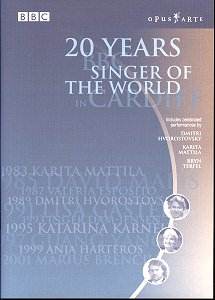










BUY NOW
DVD: Competition Winners
1983: Karita Mattila
‘Donna Anna’s Aria’ from Don Giovanni- Mozart [2’43"]
‘Leise, Leise’ from Der Freischütz – Weber [8’30"]
Award presentation [0’38"]
BBC Welsh Symphony Orchestra conducted by Richard Armstrong
1985: David Mallis
‘E ‘un sogno’ [Ford’s Monologue} from Falstaff – Verdi [4’39"]
‘Largo al factotum’ from The Barber of Seville – Rossini [4’45"]
Award presentation [1’07"]
BBC Welsh Symphony Orchestra conducted by Richard Armstrong
1987: Valeria Esposito
‘Comme autrefois’ from The Pearl Fishers – Bizet [6’37"]
‘Chi il bel sogno di Doretta’ from La Rondine – Puccini [2’59"]
‘Qui la voce sua soave’ from I Puritani – Bellini [6’09"]
Award presentation [1’07"]
BBC Welsh Symphony Orchestra conducted by Richard Armstrong
Julian Smith (accompanist)
1989: Dmitri Hvorostovsky
‘Eri tu che macchiavi’ from Un Ballo in Maschera – Verdi [6’17"]
‘Jeletzky’s Aria’ from Queen of Spades – Tchaikovsky [5’09"]
‘Rodrigo’s Aria’ from Don Carlos – Verdi [4’55"]
‘The death of Rodrigo’ from Don Carlos – Verdi [3’50"]
Award presentation [1’01"]
BBC Welsh Symphony Orchestra conducted by Richard Armstrong
1991: Lisa Gasteen
‘Dich, tuere Halle’ from Tannhaüser – Wagner [3’36"]
‘Schlafst du, Gast?’ from Die Walküre – Wagner [5’49"]
‘Pace, pace, mio Dio’ from La Forza Del Destino – Verdi [5’35"]
Award presentation [1’08"]
BBC Welsh Symphony Orchestra conducted by Guido Ajmone-Marsan
1993: Inger Dam-Jensen
‘Amor’ from Six Songs (Brentano-Lieder), Op.68, No 5 – R. Strauss [3’11"]
‘Misera, dove son? Ah, non son io che parlo’ K369 – Mozart [6’46"]
‘Let the bright Seraphim’ from Samson – Handel [5’29"]
Award presentation [1’22"]
BBC Welsh Symphony Orchestra conducted by Guido Ajmone-Marsan
Christen Stubbe (accompanist)
1995: Katarina Karnéus
‘Ging heuf morgen über’s Feld’ from Lieder eines fahrenden Gesellen – Mahler [4’23"]
Seguidilla: ‘Près des remparts de Séville’ [2’17"]
‘Heart, we will forget him’ from Twelve Poems of Emily Dickinson – Copland [2’19"]
‘Why do they shut me out of heaven?’ from Twelve Poems of Emily Dickinson Copland [2’03"]
‘Nacqui all’affanno/Non piu mesta’ from La Cenerentola – Rossini [6’20"]
Award presentation [1’09"]
BBC National Orchestra of Wales conducted by Carlo Rizzi
Ingrid Surgenor (accompanist)
1997: Guang Yang
‘Connais-tu la pays?’ from Mignon – Thomas [5’22"]
‘Nacht und Träume’ Op. 43, No. 2 – Schubert [4’05"]
‘Der Tod und das Mädchen’ Op. 7, No. 3 – Schubert [3’00"]
‘Nacqui all’affanno/Non piu mesta’ from La Cenerentola – Rossini [6’20"]
Award presentation [0’47"]
BBC National Orchestra of Wales conducted by Carlo Rizzi
Ingrid Surgenor (accompanist)
1999: Anja Harteros
‘Temerari…Come scoglio’ from Cosi fan tutte – Mozart [5’56"]
‘Am Sonntag Morgen’ Op. 49, No. 1 – Brahms [1’22"]
‘Was will die einsame Träne?’ Op. 25, No.21 – Schumann [3’05"]
‘E Strano…sempre libera’ from La Traviata – Verdi [7’36"]
Award presentation [1’00"]
BBC National Orchestra of Wales conducted by Carlo Rizzi
Wolfgang Kastorp (accompanist)
2001: Marius Brenciu
‘Cielo e mar!’ from La Gioconda – Ponchielli [5’01"]
‘Die nacht’ Op.10, No. 3 – R Strauss [3’04"]
‘Changeons propos’ from Sept Chansons de Clement Marot Op.5, No.6 – Enescu [2’23"]
‘Lensky’s Aria’ from Eugene Onegin – Tchaikovsky [7’12"]
Award presentation [3’07"]
BBC National Orchestra of Wales conducted by Jean-Yves Ossonce
Ingrid Surgenor (accompanist)
DVD 2:
Documentary: Twenty Years BBC Singer of the World in Cardiff [33’25"]
Lieder (Song) Prize Winners
1989: Bryn Terfel
‘In der fremde’ Liederkreis Op. 39 – Schumann [1’57"]
‘Intermezzo’ Liederkreis Op. 39 – Schumann [1’56"]
‘Die Stille’ Liederkreis Op. 39 – Schumann [1’36"]
‘Schöne Fremde’ Liederkreis Op. 39 – Schumann [1’19"]
Bonus: ‘Non piu andrai from The Marriage of Figaro – Mozart [1’57"]
Bonus: ‘The Dutchman’s Aria’ from The Flying Dutchman – Wagner [11’28"]
Award presentation [0’33"]
Malcolm Martineau (accompanist)
1991: Neal Davies
‘Did you hiccup, Natasha?’ – Rachmaninov [2’07"]
‘Letter to K. S. Stanislavski’ – Rachmaninov [3’43"]
‘Erlkönig’ – Schubert [1’24"]
Award presentation [1’01"]
Ingrid Surgenor (accompanist)
1993: Paul Whelan
‘Am Bach im Frühling’ D361 – Schubert [1’52"]
Bonus: ‘Hai gia vinta la causa’ from The Marriage of Figaro – Mozart [1’55"]
Award presentation [0’39"]
Ingrid Surgenor (accompanist)
1995: Kirsi Tiihonen
‘Wehe, so willst du mich wieder’ Op. 32, No. 5 – Brahms [1’57"]
‘Es traümte mir’ Op. 57, No. 3 – Brahms [3’33"]
‘Vesnie Vodys’ (‘Spring Waters’) from Twelve Songs – Rachmaninov [2’28"]
Award presentation [0’42"]
Satu Salminen (accompanist)
1997: Christopher Maltman
‘Ständchen’ from Schwanengesang – Schubert [3’47"]
‘Winter Evening’ Op. 13, No. 1 – Medtner [3’10"]
Award presentation [[1’10"]
Phillip Thomas (accompanist)
1999: Dea-San No
‘Oh! Mountain’ – Dong-Soo Shin [4’29"]
‘Nebbie’ – Respighi [1’22"]
Award presentation [1’09"]
Ingrid Surgenor (accompanist)
2001: Marius Brenciu
‘In der fremde’ Liederkreis Op. 39 – Schumann [2’02"]
‘Intermezzo’ Liederkreis Op. 39 – Schumann [1’45"]
‘Waldesgesprach’ – Schumann [2’07"]
‘Die nacht’ Op.10, No. 3 – R Strauss [3’04"]
‘Changeons propos’ from Sept Chansons de Clement Marot Op.5, No.6 – Enescu [2’23"]
Award presentation [3’07"]
Ingrid Surgenor (accompanist)
The Battle of the Baritones [3’14"]
PAL All Regions
16/9 Anamorphic and 4/3 (Archive material)